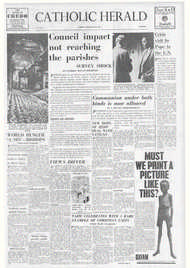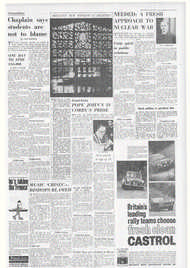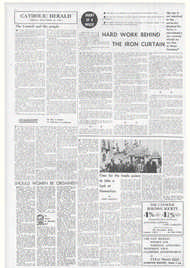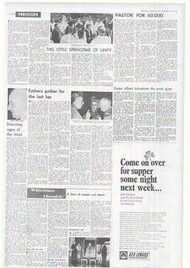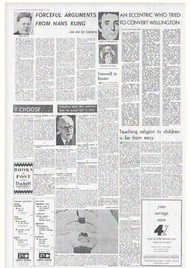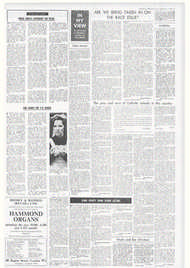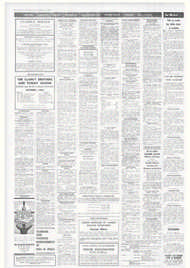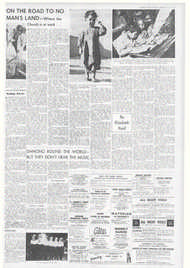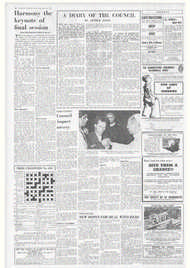Page 1, 10th September 1965
Page 1

Page 10

Report an error
Noticed an error on this page?If you've noticed an error in this article please click here to report it.
Tags
Share
Related articles
Many Catholics Have Not Heard Of Vatican Ii But Race...
Catholics Liven Up Ecumenical Groups
Survey Shows Apathy And Impatience
Catholic Herald Gallup Poll Survey
The Surveys Commissioned By The Catholic Herald In...
Council impact ,
not reaching the parishes
SURVEY SHOCK
BY CATHOLIC HERALD REPORTERS
INTEREST, ignorance and confusion sums up the attitude of the average British Catholic to the Vatican Council. Surveys conducted by CATHOLIC HERALD reporters around Britain, in the week before the Council resumes for the final session, show that its impact is threatened by a critical communications breakdown.
People feel that information is reaching the national and diocesan levels but is failing to get through to them in the parishes. They feel remote and cut off from the nerve centre of the Church, they say.
Most of those interviewed welcomed both the spirit of freedom brought about by the Council and Churches willingness to come out of isolation and face up to the contemporary world. They hoped that something on the same lines would become a regular event in the future.
But nearly 75 per cent confessed to a feeling of "confusion" about what is going on in Rome. An even higher percentage --eight out of every ten — considered the Council solely in terms of its effect on themselves or their parish. Council reports in the Catholic Press were labelled as being either too popular or too abstruse.
BISHOPS ARE ARRIVING
The majority felt that the Council was having no real effect on the major issues in the world. And they suggested that top priority should be given in this session to the population crisis, war, the Jews, Church unity, and lay involvement in Church organisation. A minority of about 3 per cent were completely indifferent.
The 2,500 Bishops of the Catholic Church are arriving in Rome for the session which begins next Tuesday. Three planeloads bringing most of the U.S. Hierarchy arrived at Fiumicino airport last Tuesday morning. The English Bishops will be arriving at different times over the weekend and settling into their quarters in the English College and the Bed a.
Desmond Fisher reports from Rome (See Page 10) that the eve-of-session mood there is one of outward confidence and inward apprehension. Most Bishops want the Council to end this session, he says, but they do not want the desire for speed and harmony to weaken the final texts.
VIEWS DIFFER
COMPLETE cross-section of the population — from dockers to teachers and from typists to doctors were interviewed in areas all over Britain during the week end to find out their views on :111111111,11111111111111111111111111111111111111111111111111111111 the Council.
Questionnaires were distributed in parishes in Bristol and Liverpool. In Leeds, the Grail and the CYMS interviewed about 150 people. Reporters also sought views outside churches and in the streets of London, Halifax, Cardiff, Edinburgh, Glasgow and in rural areas in North Wales and in ltahneNorlh and South of England.
In all, about 400 people were interviewed. Their views varied according to age, the type of parish they came from ("advanced" or "static" as some put it), and the interest in and the knowledge of conciliar affairs tended to be closely related to educational attainment and professional status, Here are some of the reports:
CARDIFF: All of those interviewed were aware that the next session of the Council was imminent but few could give the opening date. All knew that it was a meeting of Bishops from all over the world, but one or two thought that Anglican Bishops attended as members and no one mentioned the presence of laymen,
Questioned about the achievements of the Council up to now, two factors which were uppermost in people's minds were the revision of the Liturgy and the use of the vernacular in the Mass and the Sacraments, and the very great contribution the Church has made to Christian Unity. A former Anglican spoke of the vicar who would not talk to her after her conversion, but who has now become most friendly as a result of the climate produced by the Council.
Asked if they thought that discussions so far have led to confusion among Catholics about the teachings and authority of the Church, a large proportion thought that "self-searching" attitude of the Church in earlier sessions had led to confusion among those of simple faith but no one thought there had been any appreciable lessening of respect for the authority of the Church as a result of it.
All admitted and welcomed the fact that the individual freedom of Catholics had been increased since the Council was first called. Most people quoted the removal of the ban on attendance at non-Catholic churches on particular occasions
as an example of this. • Without exception, those inter Continued on Rack Page, Col. 3
viewed felt that they were all taking a more active part in worship, hut divergent views were expressed on the subject of the laity taking a share in the running of parishes. Some felt that the opinions and suggestions of parishioners were noted and acted upon but others thought that insufficient use was being made of lay experts in the many problems facing Bishops and priests in maintaining churches, schools and parishes.
While most people thought that changes recommended by the Council were introduced quickly in this country, some were of the opinion that countries such as Germany, Holland and France were more "Council-minded" and reacted more rapidly to decisions taken in the Vatican Council.
When asked what was to be discussed at the forthcoming session, the answer was invariably "birth control". Many seemed to be under the impression that arriving at a decision on this subject was the only item on the agenda.
Many seemed to think that the Church could "make some concessions". Most people agreed that a decision one svay or the other ought to be made now. A minority view was that no decision should he made at this stage, but that a careful study of the "safe period" and medical aids to pinpointing this should be awaited.
Nobody wanted the Church to make a pronouncement on the use of Atomic Weapons. Most people regarded this as something outside the sphere of religious teaching and one that the Church would find it impossible to decide upon.
Asked to suggest topics that they would like to he discussed by the Council Fathers, replies ranged from a facetious "banning of women from church choirs" to clearer ruling on and encouragement of cremation, the problem of Anglican Orders and seminary training. This last subject was mentioned by several of the Catholics interviewed who felt that the present seminary training was impractical and that every priest should have spent some time in a University' All agreed that the Council should be recalled from time to time. "flaying made such a good start in bringing the Church up to date, it would be a pity if things became stagnant again, was the way one lady put it.
NORTH CHESHIRE:
(the suburban and dormitory areas for Manchester).
Some non-Catholics were better informed than Catholics. Several people regarded the "Vatican Council" and the "Ecumenical Council" as completely separate bodies, with different functions.
All agreed that the Church would benefit from the Council. There was also agreement on the principle of ecumenism although opinions were divided over details. All the non-Catholics favoured steps for unity while recognising the difficulties ahead.
Catholic reaction to this question was much more guarded. They felt the Church was modernising too quickly, that it would be a mistake to make too many concessions to the other Churches.
The greatest thing to come out of the Council, Catholics felt, was the vernacular Mass. All favoured the use of English. But many failed to see how the Council is concerned with the problems of the world—
they tended to interpret its discussions in a purely personal way, particularly in relation to their own parish.
Amongst the younger generation there was a desire to see greater lay participation in the running and organisation of the Church at both parish and diocesan level. Several people stressed that more use could he made of professional people with special qualifications, especially in the fields of finance, and church and school building.
One man suggested a form of parish council which could relieve the parish priest of the day-to-day running of affairs, and leave him free to concentrate on purely pastoral matters.
Contraception brought the sharpest divisions. Older people thought it best not to comment, saying that they would accept whatever the Council Fathers decided. One suggested that the use of contraceptives should be left "to the Catholic Conscience", but found it difficult to define exactly what he meant.
Several thought that in view of the world population problem the Council would have to come out in favour. In almost every case it was agreed that an early decision was needed, especially in view of the world-wide interest being shown in this problem.
Over half the people questioned thought that there should be some form of a more permanent Council, feeling that it was a mistake to allow too long to elapse before another was convened. Intervals of five to ten years for a general coun cil were suggested, but one person thought that a smaller version, with, perhaps, one delegate from each country, should meet annually.
LEEDS:
Here most of the people expressed a deep interest in the Council. But because of a failure in communications they felt it had made no impact on their own lives, on lapsed Catholics, or on other Chorales.
The mere text of liturgical or other changes was insufficient— they wanted more information about the deeper reasons behind the changes. Parish priests were failing to provide this information, they said.
Among the suggestions put forward in the city were the setting up of parish committees to study the Council and explain it to the people, and training courses for priests in order to get the impact of the Council across.
A few thought that the Council had ended w ith the death of Pope John and many were not aware that it was re-assembling next week. Even those in parish societies felt they were remote from the Council.
All felt dismay at the thought of schism, but believed there were many puestions the Council should decide upon as rapidly as possible. They said the necessity to relate religion to the contemporary world vvas long overdue.
BRISTOL: The Curia came in for heavy criticism. People interviewed there thought it was "frighteningly nut of touch", that it badly needed an international character, and that it should either be reshaped or abolished. Freedom of conscience, the bomb, birth control, and the under-developed nations, they said, should he the main topics of discussion at this session.
They agreed that antilher Council should be held in the future after present recommendations were worked out ... although one commented "As soon as possible. So many questions have been left unresolved".
TO date, they felt, the Council's main achievements lay in the airing of controversies ("but so far the Church has not had the courage to commit itself," one man said), bringing the liturgy up to date, the stress placed on the importance of lay involvement, and clarifying the role of the Bishops. In Liverpool, London. Glasgow, Edinburgh and other parts of the country people agreed that so far the Council has had no effect on their lives. There was some dissatisfaction at the delay in Pronouncing on topics like birth control, Jews, and the world-food problem was also mentioned a number of times as a crucial moral issue.
blog comments powered by Disqus


